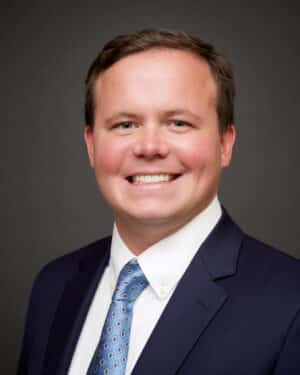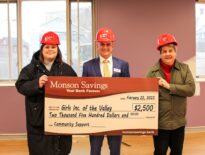Bill Senné
CEO, Senné
Age: 38
Industry experience: 15 years
Boston-based real estate brokerage and advisory firm Senné is taking to new marketing channels to make its name known to Gen Z. In January, Senné became the first local brokerage to enter the college sports names, images and likeness market when it signed Boston College lacrosse player Belle Smith as a brand ambassador. College athletes are free to receive compensation for endorsements following a 2021 U.S. Supreme Court ruling striking down earlier NCAA restrictions. Through her TikTok feed, Smith offers tips for apartment searches and links to Senné’s web site. In February, Senné became the real estate partner of the Boston Bruins, raising its profile in the local athletic scene. Bill Senné founded the company in 2009 and overseen its growth and expansion plans, with plans to add 100 agents during 2023.
Q: What was Senné’s original business model when you founded the company?
A: In 2009, I was a hothead and I thought I could figure it out and decided to go out on my own as a broker. I had been working with Century 21 renting apartments, and it was trailing the recession and I’d had a lot of success, renting apartments in the evenings as a college kid and making some money. I remember thinking, “I’m pretty good at this,” and I went to my boss and asked for a small raise. He said no, and I said, “I quit.”
Our company really has been an evolution. When I started, the vision was I loved the Cambridge market. I lived in Cambridge at the time. I was your average real estate agent. What ended up happening is I started to learn all of the inefficiencies that exist in the industry. Most of them have to do with the segmented nature of it. Your real estate agent doesn’t know what property management is. The property manager doesn’t know how financing works. I realized this is kind of nuts. I was an economics student at Boston College, so I was very curious and trying to apply all of these theories I’ve had in the real world. There’s an opportunity to develop something where the different services help each other.
Q: What’s the breakdown of Senné’s business segments and potential for growth?
A: The most visible is our brokerage. That piece of our business is hovering around 100 real estate agents. Our brokerage services have kind of hit that point where there’s a local credibility for our professionals, and the services are just at a higher level, and it’s easier for us to recruit and retain talent. We very rarely lose agents.
You read these stories about brokerages laying off staff, or recording earnings that are lower than last year. Are they all losing money, and what’s happening to the business model? The answer is in the bigger picture, we had a couple of disruptors which hit the market at a weird time, where they were offering crazy commission splits to agents. They were trying to undercut the market. We’ve never been the high-commission brokerage, and had a much better value because of the amount of marketing support to agents. We have a more comprehensive team approach, so we don’t have to change.
Q: What was the strategy behind some of your recent sponsorships?
A: Brand partnerships have to feel right. Sports and teamwork are a very easy analogy for us. Camaraderie is a theme for us. So, a sports team alignment is very logical. Boston College was an easy one for me because that’s where I went to school and I loved it, and there’s a tremendous amount of local appreciation. Everybody knows somebody who went there or went to a game there. And the Bruins are the beloved gritty team of Boston. We’re jumping into the NIL [names, images and likeness] space and trying to get ourselves in front of the younger generation.
Q: How does a business find potential partners for this type of NIL endorsement?
A: We reached out to Boston College and they referred us to a company that gave us a list of people who might be in the budget, and Belle was perfect. She’s working with us mostly on social media stuff, and some TikTok videos. There’s been a couple of posts about how to rent an apartment in Boston. I would say it was an opportunistic increase to our marketing budget. We saw it and we said, “That sounds really cool, so let’s find a way to do this.”
Q: What’s the current headcount of the company and how many additional positions are you seeking to fill in 2022?
A: The split is just under 100 agents and some property managers, development, marketing and some debt and equity advisory folks. There are about 160 employees total. My guess is that we’ll have another 100 agents by the end of the year. Our residential brokerage is growing quickly, and we’ve got a couple of acquisitions in pipeline.
Q: What is the focus of Senné’s development arm?
A: It’s a little bit less advertised, but our firm is also an active developer and investor. We build a lot of homes in Cambridge and we own a number of apartments and rent them out, and a little bit of retail. On the development side of the business, this year we will deliver 50 homes to the market in Cambridge. As a developer-investor, we have a real synergy with the development community, so a lot of our clients are developers and investors. They trust our ability to execute. We love that, because the market has a housing crunch and there’s not enough inventory out there. We’re getting clients to that new product.
Q: What direction is the Cambridge residential market headed in 2023?
A: It’s like many expensive and luxury markets are. The total number of transactions is down. The total number of listings is down relative to years past. The pricing is actually up, and that makes a little bit of sense. There’s a supply-and-demand thing, and even with these skyrocketing interest rates, a lot of people who have money have the cash. You start to see more buyers showing up with larger down payments and not needing any financing contingencies. These buyers are always really qualified.
Q: What effects are tighter lending standards having upon multifamily project financing?
A: There is absolutely a tightening on the commercial landing side. Banks are trying to get out of deals they don’t like. If a deal made sense at 4 or 5 percent, now that interest rate is 7.5 percent. It may not make sense anymore. There are developers out there trying to sell those permitted projects, hoping that a wealthier developer will come along. The last six or seven years have been an expansion time, so developers and investors were trying to get 75 or 80 percent financing on a project. If we were going out for debt financing today, it would be hard to find a commercial lender who would go above 70 percent.
Senné’s Five Favorite Summer Afternoon Hangouts
- Sevens in Beacon Hill
- New Republic in Cambridge
- Sail Loft on Boston’s waterfront
- The Chartroom in Cataumet
- Beach on Bassetts Island, Bourne






